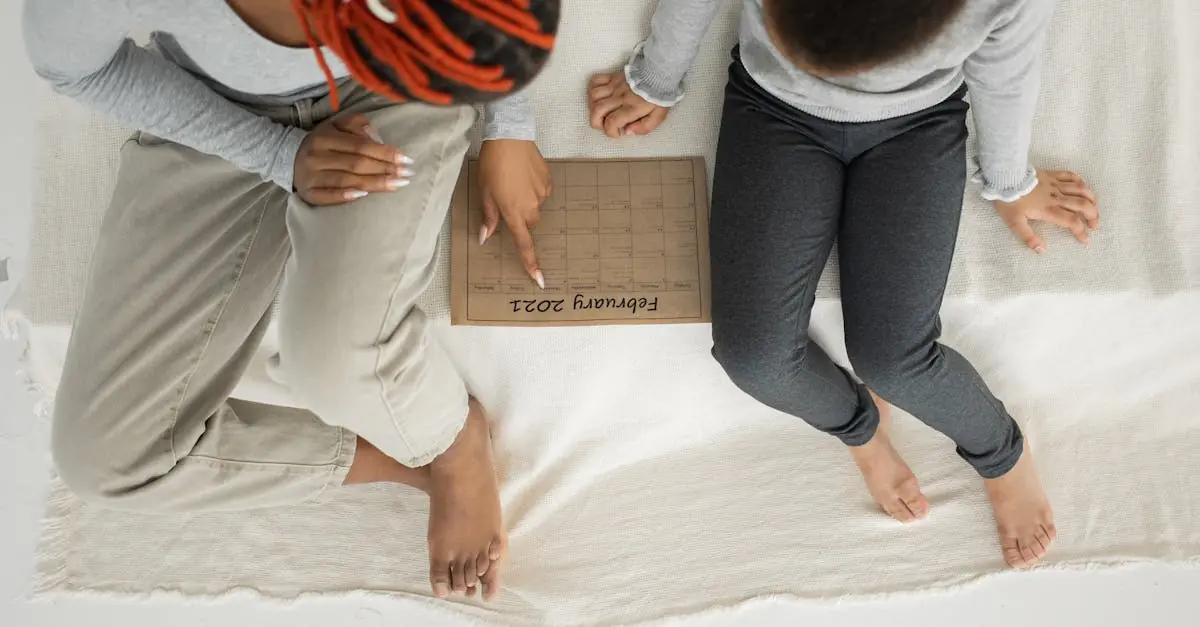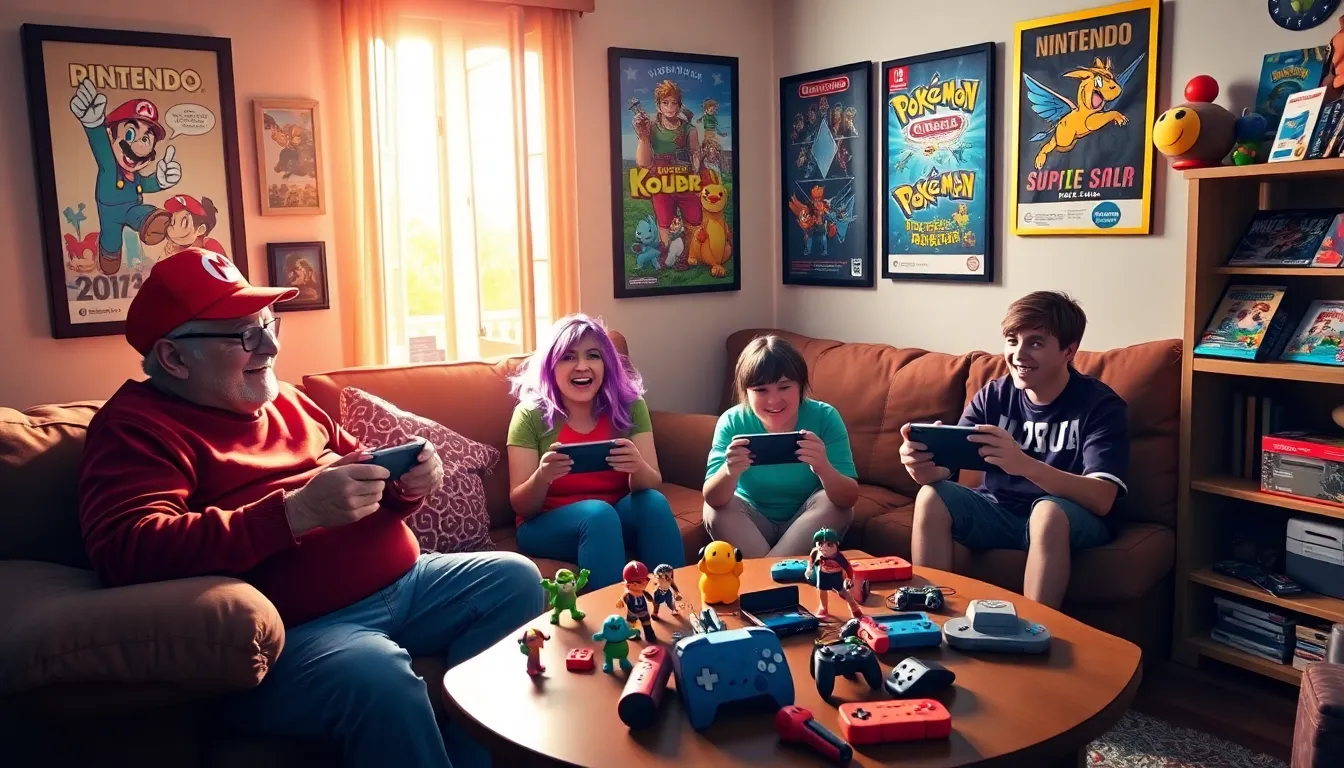Navigating co-parenting can feel like trying to solve a Rubik’s Cube blindfolded. Enter the 2-2-3 parenting schedule—a game-changer for families juggling time with kids. This clever approach allows parents to split the week into manageable chunks, ensuring everyone gets quality time without the chaos.
Picture this: two days with one parent, two days with the other, and then a glorious three-day weekend. It’s like a mini-vacation for kids every week! Not only does this schedule keep things balanced, but it also helps kids thrive in a stable environment. So, if you’re ready to ditch the drama and embrace a structured routine that works, the 2-2-3 schedule might just be your new best friend.
Table of Contents
ToggleOverview of 2-2-3 Parenting Schedule
The 2-2-3 parenting schedule, a popular co-parenting arrangement, effectively balances parenting responsibilities. It divides each week into distinct segments, allowing one parent to have the children for two days, followed by the other parent for two days, and culminating with a three-day weekend shared between both parents. This rotation establishes a structured routine while maximizing the quality of time spent with the children.
Unique benefits arise from this schedule. It offers predictability, crucial for children’s emotional stability. Parents can plan activities and routines more effectively, decreasing the chaos that often accompanies co-parenting situations. Each parent enjoys uninterrupted time with the kids, fostering stronger bonds through shared experiences.
Flexibility is another significant advantage. During the three-day weekend, parents can opt to alternate holidays or special occasions, giving them a chance to celebrate family milestones together. This adaptability allows parents to cater to individual needs while ensuring consistent parenting engagement.
Communication remains essential in this setup. Consistent dialogue between parents aids in tracking schedules and addressing the children’s needs. They collaborate on decisions, reinforcing mutual respect and shared parenting goals.
The 2-2-3 parenting schedule enhances co-parenting dynamics, nurturing children’s growth in a stable environment. Its structured approach supports both parents and children by promoting a balanced, engaged family life.
Benefits of the 2-2-3 Parenting Schedule
The 2-2-3 parenting schedule offers numerous advantages that can significantly improve co-parenting dynamics. By providing a structured routine, this schedule promotes stability and emotional security for children.
Enhanced Bonding with Children
Strengthened relationships occur through consistent, quality time. Parents share two consecutive days, allowing for daily activities and communication. Kids benefit from the predictability of seeing each parent regularly, fostering emotional security. Shared weekends enable families to create lasting memories through joint outings and events. Opportunities for parents to engage in their children’s interests arise naturally within this framework, enhancing connection. Bonding grows as each parent becomes an active participant in their child’s life.
Balanced Time with Each Parent
Fair distribution of time ensures each parent has ample opportunity to connect with their children. The alternating schedule offers equal chances for involvement in daily routines and special occasions. Parents appreciate the chance to be present during important moments, such as school events and extracurricular activities. Children experience a balanced parental presence, promoting healthier relationships with both caregivers. Over time, this arrangement supports a sense of belonging, as kids learn to appreciate time spent with both parents. The 2-2-3 schedule cultivates harmony and reduces feelings of separation.
Challenges of the 2-2-3 Parenting Schedule
Navigating a 2-2-3 parenting schedule presents unique hurdles for co-parents. Families often face difficulties adjusting to new routines.
Adjusting to New Routines
Establishing the 2-2-3 schedule requires time and effort. Parents may encounter confusion during the early days. Children might take longer to adapt, needing reassurance and consistency. Creating a transition plan can help ease this adjustment. Scheduling regular check-ins allows parents to assess emotional needs. New routines require flexibility and patience as everyone finds their rhythm.
Potential for Conflict
Co-parenting can lead to disagreements, especially regarding logistics. Miscommunication might arise about schedule changes, impacting plans. Conflicting parenting styles create tension, as differing approaches to discipline or activities surface. Clarifying expectations helps minimize misunderstandings. Open dialogue is crucial for addressing concerns and fostering collaboration. Prioritizing mutual respect prevents conflicts from escalating and maintains a cooperative parenting environment.
Tips for Implementing the 2-2-3 Parenting Schedule
Effective communication and adaptability are vital for the smooth implementation of the 2-2-3 parenting schedule.
Communication Strategies
Establish clear communication channels to discuss schedules and changes. Regular check-ins promote alignment between parents regarding logistics. Use shared calendars to track important dates, ensuring everyone stays on the same page. Avoid assumptions; instead, clarify expectations and responsibilities openly. Active listening strengthens the collaborative effort, making sure both parents feel heard. Address any concerns promptly, reducing potential conflicts caused by misunderstandings. Open dialogue about children’s needs fosters a supportive environment, crucial for their emotional security.
Flexibility and Adaptability
Flexibility is essential in co-parenting dynamics. Anticipate unexpected events that may disrupt the schedule and be prepared to adjust accordingly. Parents can swap days if necessary, allowing for spontaneous quality time with children. Adapt the routine to accommodate extracurricular activities, ensuring that children’s needs remain a priority. Using problem-solving skills during conflicts enhances the partnership between parents. Remain open to modifying the arrangement as children grow and their needs change, which promotes a stronger family bond. Embracing adaptability leads to a more harmonious experience for everyone involved.
The 2-2-3 parenting schedule offers a practical solution for co-parents seeking a balanced approach to shared parenting. By providing a structured routine that prioritizes quality time and emotional stability, this schedule helps families navigate the complexities of co-parenting with greater ease.
With its emphasis on predictability and flexibility, the 2-2-3 arrangement fosters stronger bonds between parents and children, creating opportunities for meaningful interactions. Open communication and adaptability are key to overcoming challenges, ensuring that both parents remain engaged and supportive.
Ultimately, the 2-2-3 schedule not only nurtures children’s growth but also cultivates a cooperative co-parenting environment, promoting a harmonious family life.






